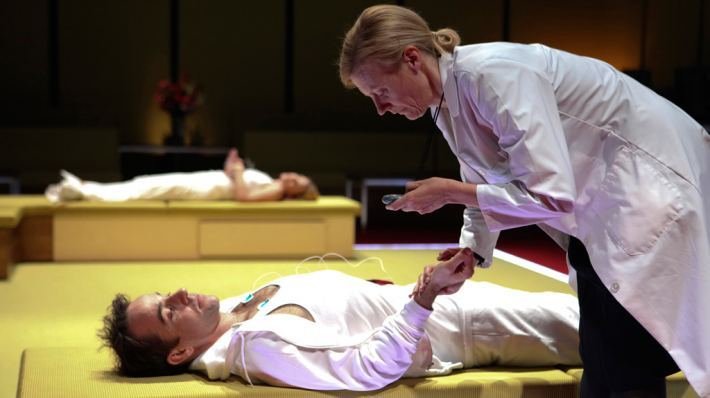NEW YORK CITY: New Yorkers typically don’t need plane tickets to experience London theatre: Just this season they might sample the Royal Shakespeare Company’s history plays at the Brooklyn Academy of Music, the Young Vic’s revival of Arthur Miller’s A View From the Bridge on Broadway, and Brits Off-Broadway at 59E59, just for starters. But all these are imports in one way or another; it’s rarer to see a U.K. nonprofit produce in America. But that’s what’s happening with Lucy Prebble’s The Effect. While the play had its world premiere at the National Theatre in London, in collaboration with Headlong, the creative team and cast wanted a future life for the show. When a West End or New York transfer didn’t come together, they tried another way.

“We felt that it was one of the shows that got away,” said Tim Levy, director of National Theatre America, who oversees the transfers of NT shows to the States as well as scouts American artists to bring to the U.K. (NT shows that have moved across the pond include War Horse, One Man, Two Guvnors, The History Boys, and The Curious Incident of the Dog in the Nighttime). Confident that The Effect would eventually have an American production, Levy wondered, “What if we encouraged that American production to happen with partners and remained a part of it, even though it wasn’t technically our original National Theatre production?”
So, in a first for Off-Broadway, the National has teamed in commercial partnership with Jean Doumanian Productions (August: Osage County, The Mountaintop, Our Town) on a new American production of The Effect at the Barrow Street Theatre, in an open-ended run. The play, set at a clinical trial for a new antidepressant, explores the relationship between two participants who start to develop feelings for each other, which may or may not be a side effect of the drug.
American Theatre spoke with Levy about bringing The Effect to New York and what it might mean for potential future partnerships between the National and U.S.-based nonprofits.
Most of the shows that the National Theatre has brought to America have been commercial transfers to Broadway. Why did you bring The Effect Off-Broadway?
It came about mainly from a conversation with Lucy about what she wanted for the play. She said to us very clearly that she’d written a play that would work best Off-Broadway in terms of its size and scale and delicacy, which is an interesting thought I hadn’t particularly had before. Do playwrights sometimes feel like their show, however good, actually suits a much smaller space and would lose something in a larger space?
How did you decide to do a commercial run at the Barrow Street, as opposed to partnering with another nonprofit theatre?
The Barrow thing came about largely from my friendship with Jean Doumanian and Patrick Daly, who have done so many shows at Barrow Street and who were very big fans of Lucy’s and this play. So we started talking about life in America [for the play]. We were very keen for David Cromer to direct and they have such a tradition with him so we thought, how about we just do it directly? Apart from learning about commercial Off-Broadway—which is fascinating in and of itself—we also felt like we could remain deeply involved in the process, which is bit harder when a show just goes to a not-for-profit. The main impetus is encouraging them to do the show, and once they’re doing it, you cheerlead.
When you transfer shows, you usually bring the British company and creative team. Why did you decide on an American team and cast for The Effect?
In this piece in particular, the location is never specified. It really takes place entirely within this clinical trial that could be anywhere. We thought it was a good idea not to separate the audience from the piece by insisting on a British dialect, and Lucy was really interested in the idea of rewriting the play for the voices of American actors. In a country where prescription drugs and these issues are as if not more prevalent than the U.K., there would be no divide from people’s lived experience; it could be an American story for American audiences. It’s rare you can do it, because normally you have a play that’s so culturally specific that you wouldn’t dream of changing it because it would unravel too many things.
Has the National Theatre ever produced an American production this way before?
No. It’s very regular that our plays will have the world premiere with us, and if we don’t move them, the American rights will be picked up and they’ll be done by a great not-for-profit theatre company over here. Typically, what happens then is you have that title page line that says, “This play was originally produced by the National Theatre.” The main difference here is that we are an active producer on it with Barrow Street and Jean Doumanian Productions.
How is your role different in this case?
When you do a transfer, you’re looking at what changes will need to be made and how to position the show in this market, but you basically have a finished production concept. This is much more akin to us producing a new play in London with a new team. It’s more of a creatively challenging and interesting role because it’s all brand-new rather than a transfer.

Lucy Prebble’s main credit in the U.S. is ENRON, which didn’t do very well here. Did that make you nervous about bringing her work over again?
I’ve known Lucy a very long time, back from the beginning of me being at the National, so I’ve followed her career very closely as a fan and a friend. Her first play was The Sugar Syndrome, which is a very delicate beautiful four-hander [about pedophilia]. In a way, what her plays seem to always have in common is that she’s interested in tackling very big, difficult subject matter. Here, it’s the bigger question: What is love? She takes on these big topics and researches them like crazy; she’s fiercely intelligent. With doing transfers, the more you do, the more of a sense you have of whether something might work with an American audience or British audience if you’re going the other way. But you actually never know.
What does producing Off-Broadway mean for the National—do you think you’ll do it again?
It comes under a banner for us of thinking slightly more organically about our shows and how to best bring them to America. Over the last decade or so, we’ve almost entirely done commercial transfers of our very biggest hits into a Broadway house, and we absolutely hope to keep doing that. We do 20 shows a year, many we’re extraordinarily proud of, but they’re not Broadway shows. We’re not creating shows that are obviously commercial because if they were, then you’d just do them commercially. So when we have shows that are really wonderful but perhaps not quite so obvious a slam dunk on on Broadway, I’m in conversations with Rufus Norris and Lisa Burger, the director and executive director at the National, about different models of ways we can partner with other American not-for-profits, different ways we can tour or play in smaller not-for-profit venues that would allow the work to be seen, but also give it a sense of protection. So we’re not putting shows up on Broadway for 20 weeks that might not work there or shouldn’t be there in the first place.
Would you ever consider producing as a nonprofit organization in the States?
I don’t think that’s immediately obvious. We are the National Theatre of Great Britain. We’re definitely interested in what more collaborations and coproductions would look like. So rather than the National producing in America, I could absolutely see a world where on the right project with the right partner we might take on a project, say with an American not-for-profit, develop it together, and then the American not-for-profit presents it in the U.S. and we present it the U.K. That idea feels more in our comfort zone than the idea of just taking on significant producing of new work that we haven’t done in the U.K. before.
Have you ever partnered with an American nonprofit?
We partner with them when we bring their shows over to the National. We’ve brought quite a lot of shows over from Steppenwolf, like August: Osage County, or the Public with Here Lies Love. It would be a new thing for us to actually develop from commission onward a piece of theatre [with an American company]. It’s always best for those projects to happen organically when the right artist and the right idea that feels like both an American theatre and a British theatre working together would add more value than just if we were doing it on our own.


